人教版(2019)选择性必修 第二册Unit 1 Science and Scientists Using language 课件(共42张PPT)
文档属性
| 名称 | 人教版(2019)选择性必修 第二册Unit 1 Science and Scientists Using language 课件(共42张PPT) | 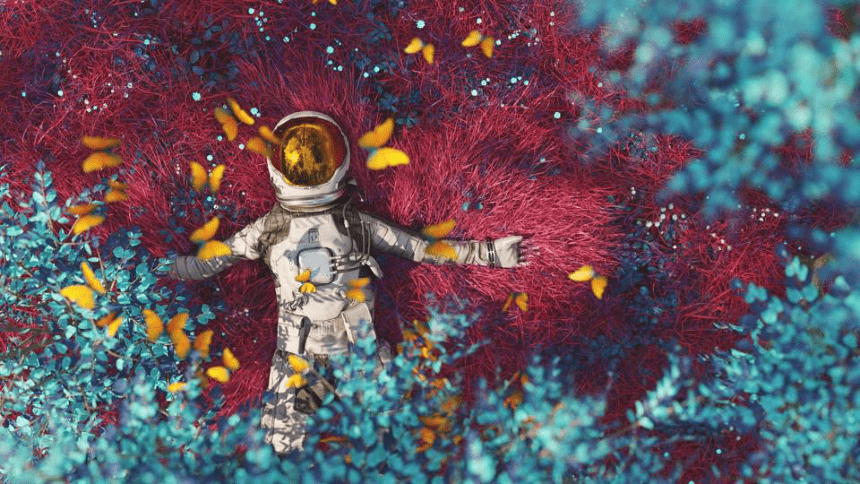 | |
| 格式 | zip | ||
| 文件大小 | 3.7MB | ||
| 资源类型 | 教案 | ||
| 版本资源 | 人教版(2019) | ||
| 科目 | 英语 | ||
| 更新时间 | 2023-02-08 15:03:41 | ||
图片预览

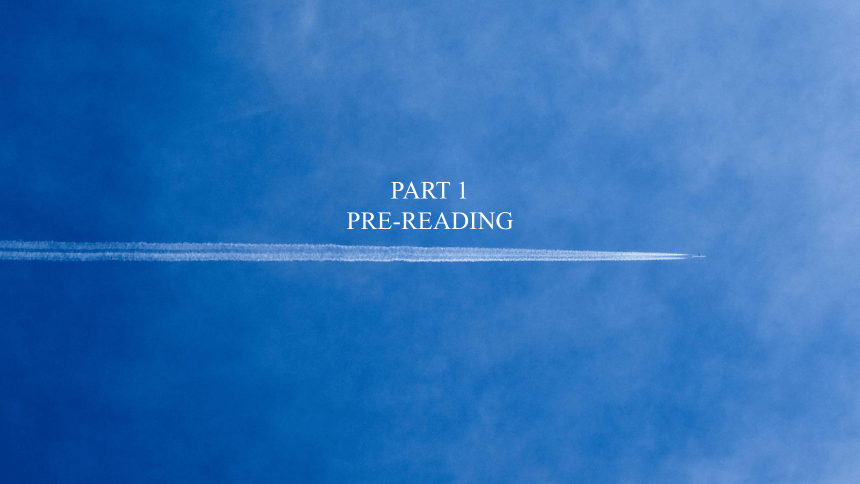
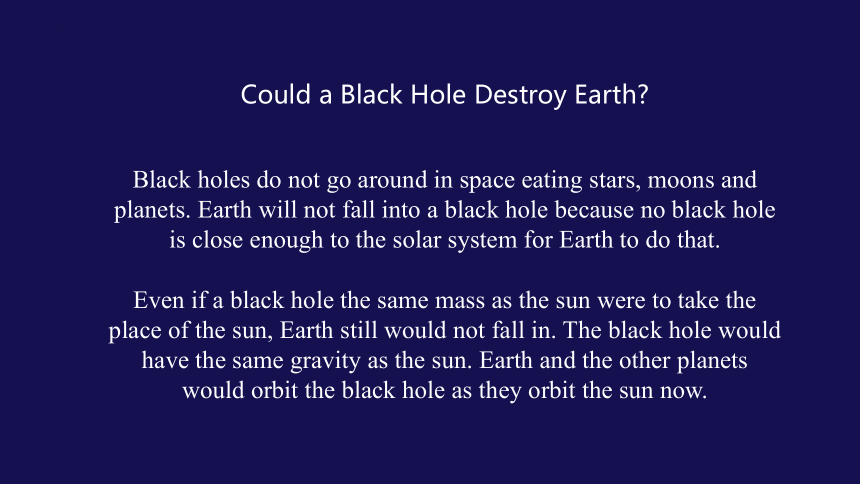
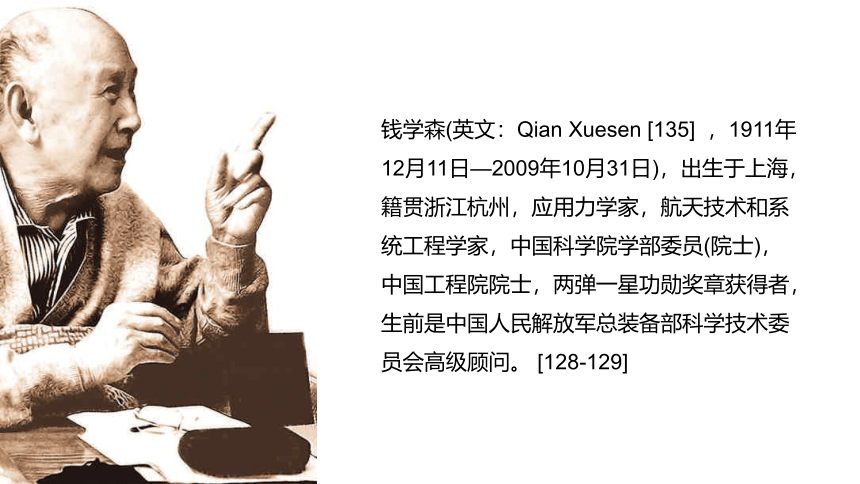
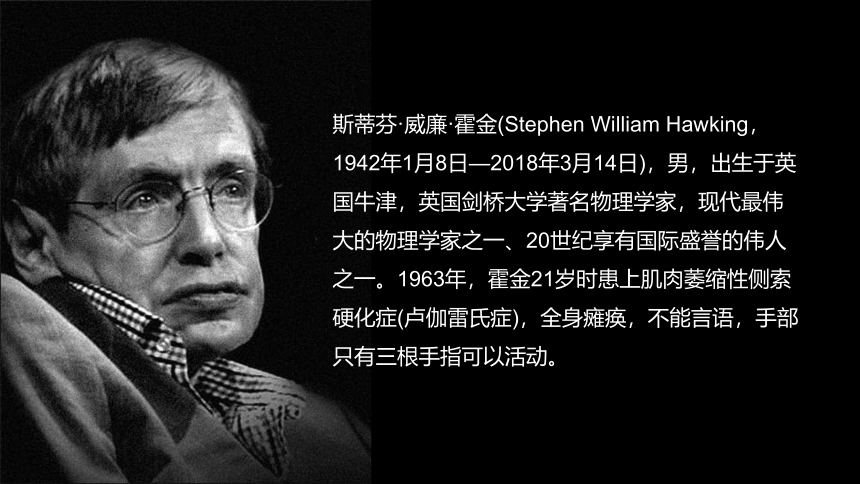
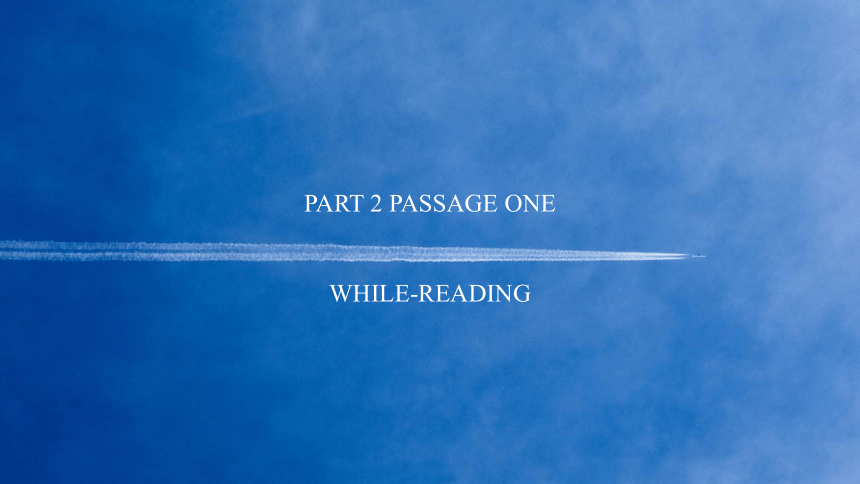
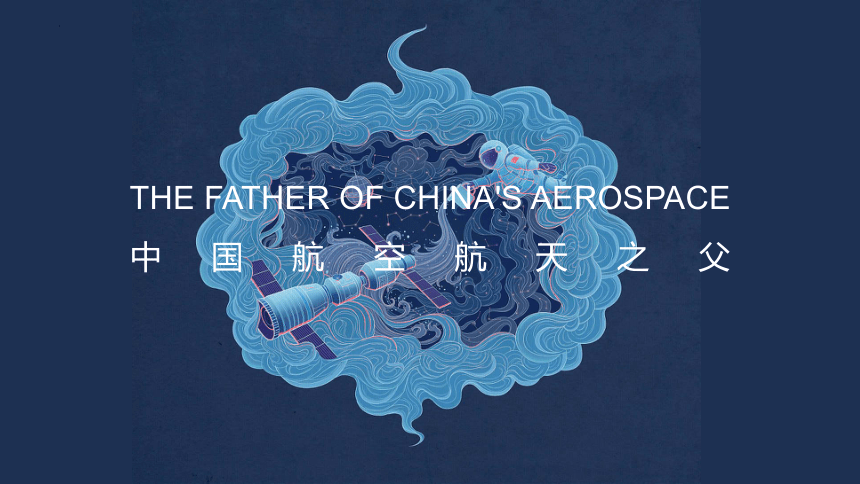

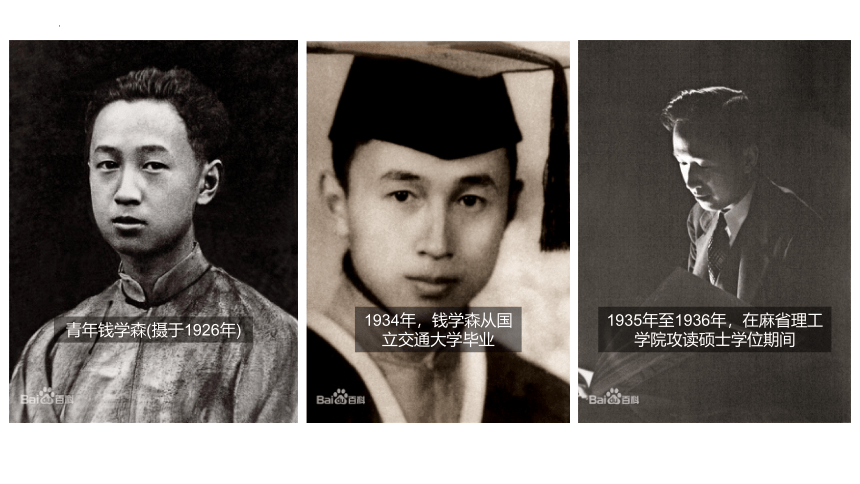
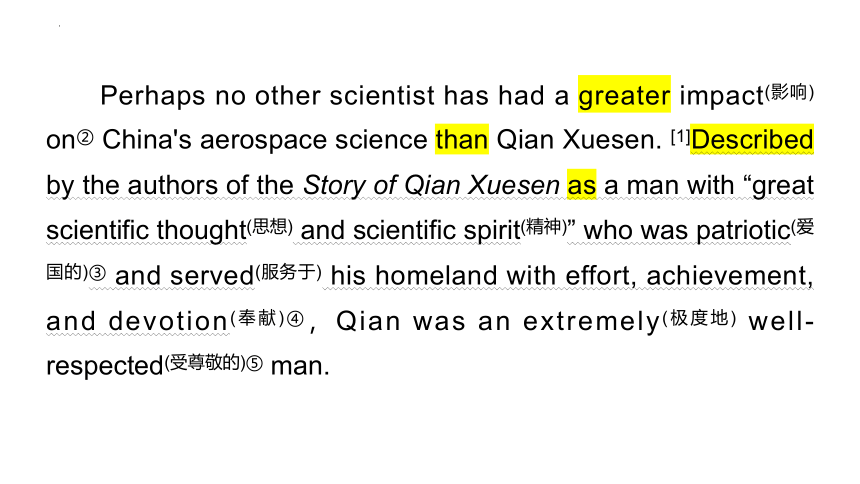
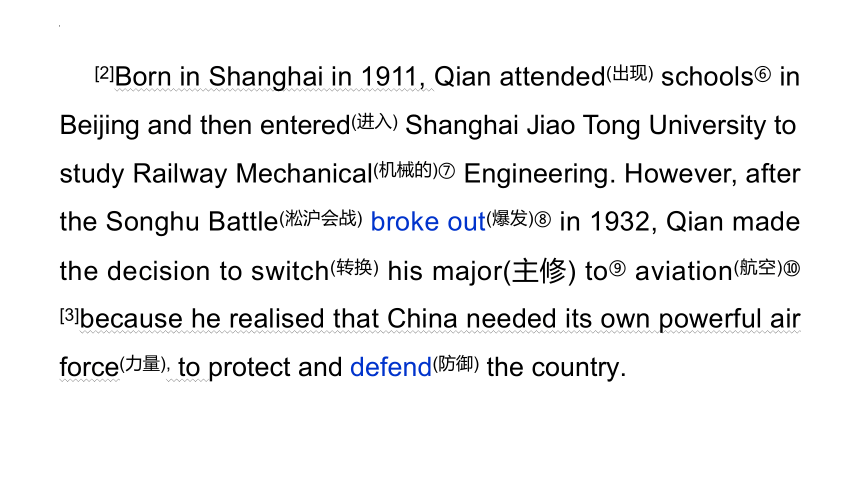
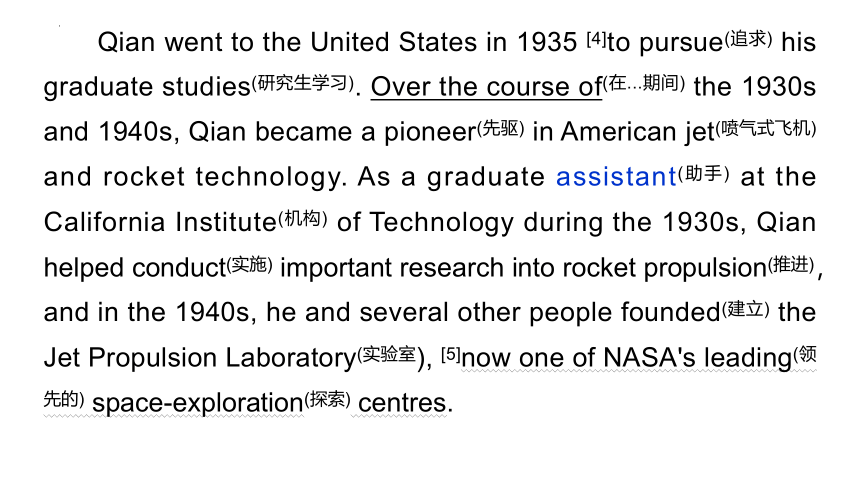
文档简介
(共42张PPT)
PART 1
PRE-READING
Could a Black Hole Destroy Earth
Black holes do not go around in space eating stars, moons and planets. Earth will not fall into a black hole because no black hole is close enough to the solar system for Earth to do that.
Even if a black hole the same mass as the sun were to take the place of the sun, Earth still would not fall in. The black hole would have the same gravity as the sun. Earth and the other planets would orbit the black hole as they orbit the sun now.
钱学森(英文:Qian Xuesen [135] ,1911年12月11日—2009年10月31日),出生于上海,籍贯浙江杭州,应用力学家,航天技术和系统工程学家,中国科学院学部委员(院士),中国工程院院士,两弹一星功勋奖章获得者,生前是中国人民解放军总装备部科学技术委员会高级顾问。 [128-129]
斯蒂芬·威廉·霍金(Stephen William Hawking,1942年1月8日—2018年3月14日),男,出生于英国牛津,英国剑桥大学著名物理学家,现代最伟大的物理学家之一、20世纪享有国际盛誉的伟人之一。1963年,霍金21岁时患上肌肉萎缩性侧索硬化症(卢伽雷氏症),全身瘫痪,不能言语,手部只有三根手指可以活动。
PART 2 PASSAGE ONE
WHILE-READING
THE FATHER OF CHINA'S AEROSPACE
中国航空航天之父
青年钱学森(摄于1926年)
1934年,钱学森从国立交通大学毕业
1935年至1936年,在麻省理工学院攻读硕士学位期间
Perhaps no other scientist has had a greater impact(影响) on② China's aerospace science than Qian Xuesen. [1]Described by the authors of the Story of Qian Xuesen as a man with “great scientific thought(思想) and scientific spirit(精神)” who was patriotic(爱国的)③ and served(服务于) his homeland with effort, achievement, and devotion(奉献)④,Qian was an extremely(极度地) well-respected(受尊敬的)⑤ man.
[2]Born in Shanghai in 1911, Qian attended(出现) schools⑥ in Beijing and then entered(进入) Shanghai Jiao Tong University to study Railway Mechanical(机械的)⑦ Engineering. However, after the Songhu Battle(淞沪会战) broke out(爆发)⑧ in 1932, Qian made the decision to switch(转换) his major(主修) to⑨ aviation(航空)⑩ [3]because he realised that China needed its own powerful air force(力量), to protect and defend(防御) the country.
Qian went to the United States in 1935 [4]to pursue(追求) his graduate studies(研究生学习). Over the course of(在...期间) the 1930s and 1940s, Qian became a pioneer(先驱) in American jet(喷气式飞机) and rocket technology. As a graduate assistant(助手) at the California Institute(机构) of Technology during the 1930s, Qian helped conduct(实施) important research into rocket propulsion(推进),and in the 1940s, he and several other people founded(建立) the Jet Propulsion Laboratory(实验室), [5]now one of NASA's leading(领先的) space-exploration(探索) centres.
After overcoming(克服) some difficulties during his final few years in the US, Qian returned to China in 1955. He received a hero's welcome from his homeland(家乡) and was put in charge of(掌管) not only developing China's rocket science but also its space and missile(导弹) programme(项目). At that time, China was poor and its rocket science was undeveloped(未发展).
No institute(机构) or university in China offered rocket science as a major, and there were no talents(人才) or experts(专家) in this field(领域) in China. Nevertheless(除此之外), Qian did not let that discourage(使...气馁) him from taking on the challenge. [7]When asked “Can we Chinese possibly make missiles?”,his reply was a determined(坚定的) “Why not We Chinese are able to make the same things that other people make.”
Under Qian's leadership(领导), China developed the Dongfeng missiles, [8]followed by the first generation of Long March(长征) rockets. In 1970, China successfully launched(发射) its first man-made satellite(卫星), Dong Fang Hong Ⅰ,from a Long March rocket. [9]Because much of the technology behind the Shenzhou rockets can also be traced(追踪) back to Qian's research, Qian earned(挣得) the name of “the father of China's aerospace”.
Qian read a lot and was extremely knowledgeable(知识渊博), especially in the area of frontier(前线) science research. However, [10]what might have made him such an outstanding(杰出) and creative scientist was probably(可能) his strong interest in other things, such as music and drawing(绘画). His deep appreciation(欣赏) for art often gave him inspiration(灵感)in his scientific research.
On 31 October 2009, the whole country was saddened(伤心) by Qian's death, and people honoured(尊敬) and remembered him in different ways.
Evaluation of Qian Xuesen No other scientist has had a greater (1) on China’s aerospace science than Qian Xuesen.
impact
THE PASSAGE STRUCTURE OF
THE FATHER OF CHINA'S AEROSPACE
His whole life In 1911 Qian Xuesen (2) .
In 1932 Qian made the decision
(3) .
Between the 1930s and 1940s Qian became
(4) .
In 1955 Qian (5) .
In 1970 Qian successfully
(6) .
In 2009 Qian (7) .
was born in Hangzhou
to switch his major to aviation(航天)
a pioneer in American jet and rocket technology
returned to China
launched the first man-made satellite(卫星)
passed away
PART 2 PASSAGE TWO
WHILE-READING
A WORLD OF PURE THOUGHT
单纯的思想世界
Stephen Hawking was one of the most famous and gifted(有天赋的) scientists in physics. Most people are familiar(熟悉) with images(形象) of him in his wheelchair(轮椅), unable to move and [1]using a computer to talk. Since he came down(患上) with a disease which caused him to lose the use of most of his muscles(肌肉),his world became one of abstract(抽象的) thought.
Hawking first achieved(达成) fame(名声) when he was still healthy enough to walk, as a graduate student (研究生)in physics at Cambridge University in 1964. In general(通常),there were two main theories on the origin(起源) of the universe. The first was the steady(稳定的) state(状态) theory, which holds that the universe has no beginning or end. (稳恒态宇宙理论)
The other was the big bang(爆炸) theory, [5]which holds that the universe began at a single(单一的) point in time and space. The biggest champion(拥护者) of the steady state concept(概念) was Fred Hoyle, [6]a professor at Cambridge. (single point 奇点)
During the question and answer period(期间) after one of Hoyle's lectures(讲座), Hawking stood up and pointed out that Hoyle had made a mistake(错误) in his maths. Once the maths was corrected(纠正).,it showed that the big bang theory—and not the steady state theory—was true. Hawking's own work on the big bang theory was soon proven(证明) by astronomers(天文学家) with telescopes(望远镜). A star was born.
So, what made Stephen Hawking a genius(天才)?Besides(除了) being brilliant(聪明),he was brave, though sometimes careless in what he said or did. He was willing to say what others were afraid(害怕) to say, and to dream of [10]what others were afraid to dream about.
Furthermore(此外),he was quite determined(坚定). This had helped him as a scientist, and had helped him even more in his fight against his disease. Above all(最重要的是),Hawking was willing to admit(承认) his faults(错误). This odd(奇怪的) combination(组合) of characteristics(特质) had made him one of the greatest thinkers of the 20th and 21st centuries(世纪).
2.
Paragraph 1 Brief introduction Stephen Hawking was one of
(1) .
Paragraph 2 Hawking’s first (2) Hawking was (3) to hold
(4) .
the most famous and gifted scientists in physics
fame
brilliant
the big bang theory
Paragraph 3 Hawking’s other characteristics Hawking was (5) enough to say or do something that others can’t.
Hawking was quite (6) to be a scientist and (7) his disease.
Hawking was willing to admit his faults.
brave
determined
fought against
PART 3
POST-READING
Read the text on Pages 7-9 carefully and then choose the best answer.
1.Why did Qian Xuesen change his major to aviation
A.Because he was not interested in his former(之前的) major.
B.Because he could get a well-paid job in the future.
C.Because he felt it his duty(责任) to help his homeland.
D.Because the country asked him to do so.
√
2.What made Qian Xuesen so creative and outstanding according to the text
A.His strong interest in art like music and drawing.
B.His research in the United States.
C.His friends' encouragement(鼓励).
D.His habit of reading a lot.
√
However, what might have made him such an outstanding(杰出) and creative scientist was probably(可能) his strong interest in other things, such as music and drawing(绘画).
3.How long did Qian Xuesen stay in the United States
A.About 15 years.
B.About 20 years.
C.About 25 years.
D.About 30 years.
√
Qian went to the United States in 1935 to pursue(追求) his graduate studies(研究生学习)...(攻读硕士学位)
After overcoming(克服) some difficulties during his final few years in the US, Qian returned to China in 1955.
4.Which of the following is True about Hawking
A.He was born disabled(残疾).
B.He was afraid(害怕) to admit(承认) his faults.
C.He was brave, determined as well as brilliant.
D.He subscribed to(同意) the theory holding that the universe has no beginning or end.
√
Hawking first achieved(达成) fame(名声) when he was still healthy enough to walk...
Above all(最重要的是),Hawking was willing to admit(承认) his faults(错误).
Besides(除了) being brilliant(聪明),he was brave... Furthermore(此外),he was quite determined(坚定).
The first was the steady(稳定的) state(状态) theory, which holds that the universe has no beginning or end.
Read the texts and decide if the statements are true (T) or false (F).
1. Qian changed his major because of a shift in
personal interest.
2. Qian’s strong interest in art has a positive impact on a scientist’s development.
3. When Hawking was young, almost everyone
believed that the universe began with a big bang.
4. Because Hawking was determined, he was able to succeed even though he was ill.
PART 1
PRE-READING
Could a Black Hole Destroy Earth
Black holes do not go around in space eating stars, moons and planets. Earth will not fall into a black hole because no black hole is close enough to the solar system for Earth to do that.
Even if a black hole the same mass as the sun were to take the place of the sun, Earth still would not fall in. The black hole would have the same gravity as the sun. Earth and the other planets would orbit the black hole as they orbit the sun now.
钱学森(英文:Qian Xuesen [135] ,1911年12月11日—2009年10月31日),出生于上海,籍贯浙江杭州,应用力学家,航天技术和系统工程学家,中国科学院学部委员(院士),中国工程院院士,两弹一星功勋奖章获得者,生前是中国人民解放军总装备部科学技术委员会高级顾问。 [128-129]
斯蒂芬·威廉·霍金(Stephen William Hawking,1942年1月8日—2018年3月14日),男,出生于英国牛津,英国剑桥大学著名物理学家,现代最伟大的物理学家之一、20世纪享有国际盛誉的伟人之一。1963年,霍金21岁时患上肌肉萎缩性侧索硬化症(卢伽雷氏症),全身瘫痪,不能言语,手部只有三根手指可以活动。
PART 2 PASSAGE ONE
WHILE-READING
THE FATHER OF CHINA'S AEROSPACE
中国航空航天之父
青年钱学森(摄于1926年)
1934年,钱学森从国立交通大学毕业
1935年至1936年,在麻省理工学院攻读硕士学位期间
Perhaps no other scientist has had a greater impact(影响) on② China's aerospace science than Qian Xuesen. [1]Described by the authors of the Story of Qian Xuesen as a man with “great scientific thought(思想) and scientific spirit(精神)” who was patriotic(爱国的)③ and served(服务于) his homeland with effort, achievement, and devotion(奉献)④,Qian was an extremely(极度地) well-respected(受尊敬的)⑤ man.
[2]Born in Shanghai in 1911, Qian attended(出现) schools⑥ in Beijing and then entered(进入) Shanghai Jiao Tong University to study Railway Mechanical(机械的)⑦ Engineering. However, after the Songhu Battle(淞沪会战) broke out(爆发)⑧ in 1932, Qian made the decision to switch(转换) his major(主修) to⑨ aviation(航空)⑩ [3]because he realised that China needed its own powerful air force(力量), to protect and defend(防御) the country.
Qian went to the United States in 1935 [4]to pursue(追求) his graduate studies(研究生学习). Over the course of(在...期间) the 1930s and 1940s, Qian became a pioneer(先驱) in American jet(喷气式飞机) and rocket technology. As a graduate assistant(助手) at the California Institute(机构) of Technology during the 1930s, Qian helped conduct(实施) important research into rocket propulsion(推进),and in the 1940s, he and several other people founded(建立) the Jet Propulsion Laboratory(实验室), [5]now one of NASA's leading(领先的) space-exploration(探索) centres.
After overcoming(克服) some difficulties during his final few years in the US, Qian returned to China in 1955. He received a hero's welcome from his homeland(家乡) and was put in charge of(掌管) not only developing China's rocket science but also its space and missile(导弹) programme(项目). At that time, China was poor and its rocket science was undeveloped(未发展).
No institute(机构) or university in China offered rocket science as a major, and there were no talents(人才) or experts(专家) in this field(领域) in China. Nevertheless(除此之外), Qian did not let that discourage(使...气馁) him from taking on the challenge. [7]When asked “Can we Chinese possibly make missiles?”,his reply was a determined(坚定的) “Why not We Chinese are able to make the same things that other people make.”
Under Qian's leadership(领导), China developed the Dongfeng missiles, [8]followed by the first generation of Long March(长征) rockets. In 1970, China successfully launched(发射) its first man-made satellite(卫星), Dong Fang Hong Ⅰ,from a Long March rocket. [9]Because much of the technology behind the Shenzhou rockets can also be traced(追踪) back to Qian's research, Qian earned(挣得) the name of “the father of China's aerospace”.
Qian read a lot and was extremely knowledgeable(知识渊博), especially in the area of frontier(前线) science research. However, [10]what might have made him such an outstanding(杰出) and creative scientist was probably(可能) his strong interest in other things, such as music and drawing(绘画). His deep appreciation(欣赏) for art often gave him inspiration(灵感)in his scientific research.
On 31 October 2009, the whole country was saddened(伤心) by Qian's death, and people honoured(尊敬) and remembered him in different ways.
Evaluation of Qian Xuesen No other scientist has had a greater (1) on China’s aerospace science than Qian Xuesen.
impact
THE PASSAGE STRUCTURE OF
THE FATHER OF CHINA'S AEROSPACE
His whole life In 1911 Qian Xuesen (2) .
In 1932 Qian made the decision
(3) .
Between the 1930s and 1940s Qian became
(4) .
In 1955 Qian (5) .
In 1970 Qian successfully
(6) .
In 2009 Qian (7) .
was born in Hangzhou
to switch his major to aviation(航天)
a pioneer in American jet and rocket technology
returned to China
launched the first man-made satellite(卫星)
passed away
PART 2 PASSAGE TWO
WHILE-READING
A WORLD OF PURE THOUGHT
单纯的思想世界
Stephen Hawking was one of the most famous and gifted(有天赋的) scientists in physics. Most people are familiar(熟悉) with images(形象) of him in his wheelchair(轮椅), unable to move and [1]using a computer to talk. Since he came down(患上) with a disease which caused him to lose the use of most of his muscles(肌肉),his world became one of abstract(抽象的) thought.
Hawking first achieved(达成) fame(名声) when he was still healthy enough to walk, as a graduate student (研究生)in physics at Cambridge University in 1964. In general(通常),there were two main theories on the origin(起源) of the universe. The first was the steady(稳定的) state(状态) theory, which holds that the universe has no beginning or end. (稳恒态宇宙理论)
The other was the big bang(爆炸) theory, [5]which holds that the universe began at a single(单一的) point in time and space. The biggest champion(拥护者) of the steady state concept(概念) was Fred Hoyle, [6]a professor at Cambridge. (single point 奇点)
During the question and answer period(期间) after one of Hoyle's lectures(讲座), Hawking stood up and pointed out that Hoyle had made a mistake(错误) in his maths. Once the maths was corrected(纠正).,it showed that the big bang theory—and not the steady state theory—was true. Hawking's own work on the big bang theory was soon proven(证明) by astronomers(天文学家) with telescopes(望远镜). A star was born.
So, what made Stephen Hawking a genius(天才)?Besides(除了) being brilliant(聪明),he was brave, though sometimes careless in what he said or did. He was willing to say what others were afraid(害怕) to say, and to dream of [10]what others were afraid to dream about.
Furthermore(此外),he was quite determined(坚定). This had helped him as a scientist, and had helped him even more in his fight against his disease. Above all(最重要的是),Hawking was willing to admit(承认) his faults(错误). This odd(奇怪的) combination(组合) of characteristics(特质) had made him one of the greatest thinkers of the 20th and 21st centuries(世纪).
2.
Paragraph 1 Brief introduction Stephen Hawking was one of
(1) .
Paragraph 2 Hawking’s first (2) Hawking was (3) to hold
(4) .
the most famous and gifted scientists in physics
fame
brilliant
the big bang theory
Paragraph 3 Hawking’s other characteristics Hawking was (5) enough to say or do something that others can’t.
Hawking was quite (6) to be a scientist and (7) his disease.
Hawking was willing to admit his faults.
brave
determined
fought against
PART 3
POST-READING
Read the text on Pages 7-9 carefully and then choose the best answer.
1.Why did Qian Xuesen change his major to aviation
A.Because he was not interested in his former(之前的) major.
B.Because he could get a well-paid job in the future.
C.Because he felt it his duty(责任) to help his homeland.
D.Because the country asked him to do so.
√
2.What made Qian Xuesen so creative and outstanding according to the text
A.His strong interest in art like music and drawing.
B.His research in the United States.
C.His friends' encouragement(鼓励).
D.His habit of reading a lot.
√
However, what might have made him such an outstanding(杰出) and creative scientist was probably(可能) his strong interest in other things, such as music and drawing(绘画).
3.How long did Qian Xuesen stay in the United States
A.About 15 years.
B.About 20 years.
C.About 25 years.
D.About 30 years.
√
Qian went to the United States in 1935 to pursue(追求) his graduate studies(研究生学习)...(攻读硕士学位)
After overcoming(克服) some difficulties during his final few years in the US, Qian returned to China in 1955.
4.Which of the following is True about Hawking
A.He was born disabled(残疾).
B.He was afraid(害怕) to admit(承认) his faults.
C.He was brave, determined as well as brilliant.
D.He subscribed to(同意) the theory holding that the universe has no beginning or end.
√
Hawking first achieved(达成) fame(名声) when he was still healthy enough to walk...
Above all(最重要的是),Hawking was willing to admit(承认) his faults(错误).
Besides(除了) being brilliant(聪明),he was brave... Furthermore(此外),he was quite determined(坚定).
The first was the steady(稳定的) state(状态) theory, which holds that the universe has no beginning or end.
Read the texts and decide if the statements are true (T) or false (F).
1. Qian changed his major because of a shift in
personal interest.
2. Qian’s strong interest in art has a positive impact on a scientist’s development.
3. When Hawking was young, almost everyone
believed that the universe began with a big bang.
4. Because Hawking was determined, he was able to succeed even though he was ill.
